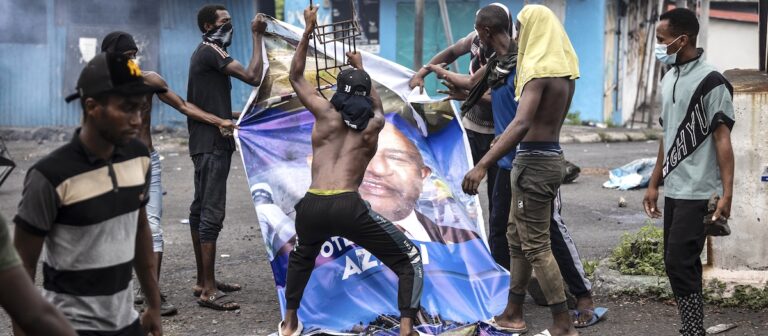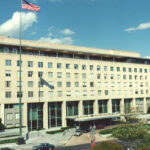Comoros opposition is unlikely to reach presidential reelection through street clashing, as army will quell protests. The risks of an armed uprising are extremely low. Assoumani could be supported by Wagner group, supposedly operating in the Comoros, like al-Bashir’s government in Sudan.
Assoumani’s evasion of term limits has eroded that democratic progress and stability. Assoumani’s growing authoritarianism fits a pattern of African leaders who gain power through extraconstitutional means, then subsequently violate legal constraints on their time in power. These actions do not occur in isolation but are part of a broader deterioration of democratic checks and balances.
President Assoumani’s opponents have rejected his election to a fifth term based on a meagre 16.3% voter turnout.
After re-election of President Azali Assoumani to an effective fifth term, violent protests against the result broke out in Moroni, the capital of Comoros.
The government responded by imposing a night-time curfew and deploying the army on the streets.
The house of a former minister was set on fire, while demonstrators blocked roads. Buildings in the capital were vandalised, looted and burned.
‘Comoros is experiencing an insurrectionary situation,’ the five losing presidential candidates said in a joint statement. This was ‘fuelled by a spontaneous reaction of indignation’ among young people against Assoumani’s perceived rigging of his victory.
The riots were sparked when the Independent National Electoral Commission (CENI) announced that Assoumani had won 62.97% of votes in the first round, avoiding a run-off. The most astonishing statistic was that only 16.3% of registered voters turned out to elect a president. So Assoumani will assume a mandate to govern with just 33 209 of his people formally backing him.
The opposition alleges that voting was fraudulent and hindered by violence, assaults on candidates, and arrests of opposition supporters, which the government denies.
At the very least, that suggests a massive vote of no confidence in Assoumani and the integrity of the presidential poll. At worst, it’s hard to avoid suspicion of vote destruction, especially because CENI had already estimated a turnout of over 60% on elections night.
As for the majority of civil society observers, they were unable to carry out their mission due to lack of accreditations.
Some opposition parties had called for a boycott of the polls.
Some of the opposition candidates are:
1. Dr Salim Issa, the opposition’s lead candidate. He was a former interior minister and flag-bearer for Juwa, the party of ex-president Ahmed Abdallah Sambi, who was in 2022 sentenced to life imprisonment for “high treason.” In his campaign, he positioned himself as a catalyst for change. His pledge to cut the president’s salary is a direct challenge to the present administration and an appeal to a populace tired of economic strife.
2. Mouigni Baraka Saïd Soilihi, the leader of the Comoros Democratic Rally for Equality. His priority is to reduce the state’s lifestyle and does not rule out the possibility of shortening his mandate if he is elected.
3. Aboudou Soefo, was the former Minister of Foreign Affairs and leader of the Tsasi movement. He has stated that his two major priorities in his program, are the fight against the high cost of living and the establishment of social safety nets to alleviate household costs.
4. Daoudou Abdallah Mohammed, is the presidential candidate and leader of the Orange party. He held the portfolio of Minister of Interior from 2016 to 2021.
Opposition leaders are also concerned that Assoumani is grooming his 39-year-old son, Nour El Fath Azali, to succeed the 65-year-old leader. Such a dynastic succession would be a further setback to the hard-fought democratic gains and stability that Comoros had enjoyed under the 2001 Constitution.
And many Comorians, even if they didn’t formally endorse a stayaway, had nonetheless, they didn’t believe in an electoral process that was a foregone conclusion.The opposition indicated its intention to refer the matter to the courts to ‘put an end to this ‘masquerade which violates the sovereign choice of the Comorian people.’ But few cherished any hope that the Supreme Court would help, as it’s widely considered a servant of Assoumani’s interests.
Assoumani’s democratic credentials are doubtless being judged against a questionable political career. As army chief of state, he seized power in a military coup in 1999 before standing down under international and regional pressure in 2002 to run in controversial elections, which he won.
He stood down again in 2006 before returning to office after winning elections in 2016. He has since been accused of creeping authoritarianism. His arch-rival ex-president Ahmed Abdallah Sambi was given a life sentence for high treason for allegedly selling passports. He prolonged his tenure by holding a controversial referendum in 2018 to extend the presidency’s lifespan to two five-year terms. The poll also scrapped the effective system of rotating each presidential term among the nation’s three islands. This rotation had ended the separatist crises that had begun in 1999.
Assoumani’s amendments ‘reset the clock’, allowing him to be re-elected in 2019 for another five years. Thus, hhe’s set to remain in office until 2029. That would total 20 years in office, spread over five terms.
‘Assoumani’s latest term has been marked by crackdowns on dissent and curtailments of press freedoms. Journalists work in an atmosphere of intimidation and fear of arrest, resulting in widespread self-censorship. Demonstrations are regularly banned. Opposition party members are threatened and detained by the police and army.
According to the US State Department, Significant human rights issues included credible reports of: unlawful or arbitrary killings by the government; torture or cruel, inhuman, or degrading treatment or punishment by the government; harsh and life-threatening prison conditions; arbitrary arrest or detention; political prisoners or detainees; politically motivated reprisals against an individual in another country; serious restrictions on free expression and media, including violence, threats of violence, and unjustified arrests or prosecutions against journalists, and the existence of criminal libel laws although not enforced; substantial interference with the freedom of peaceful assembly; severe restrictions of religious freedom; inability of citizens to change their government peacefully through free and fair elections; lack of investigation of and accountability for gender-based violence, including but not limited to domestic or intimate partner violence and sexual violence; trafficking in persons; and existence of laws criminalizing consensual same-sex sexual conduct between adults.
If the AU wanted to prevent coups, it should do more to promote fair polls and sharpen its election monitoring.
Comoros has already experienced 21 coup attempts since independence from France in 1975. And Africa is seeing an upsurge in coups, some precipitated precisely by leaders clinging to power by cynical ruses such as extensions of presidential term limits.
According to Mouigni Baraka Said Soilihi, one of Mr Assoumani’s opponents, de-facto there was no election”.Opposition candidates said they were “horrified” to note that the official results implied improbably that more than two-thirds of people voted to elect island governors but failed to cast a presidential ballot in a parallel vote in the same polling stations.




